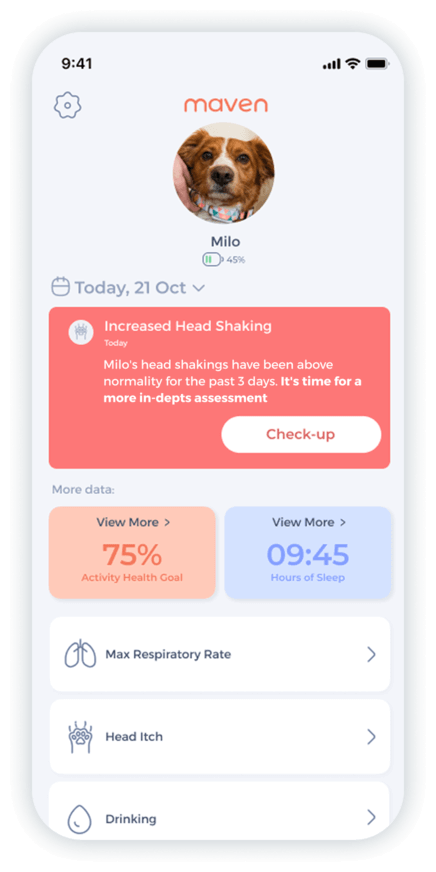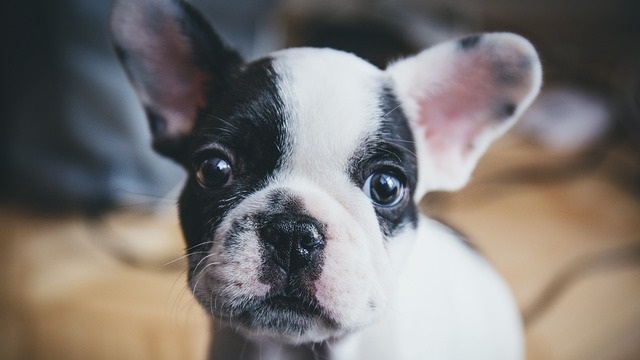Why Is My Puppy Breathing So Fast While Sleeping? Normal vs. Concerning Signs
It can be quite disheartening when you notice your puppy breathing rapidly while sleeping, especially when watching them sleep is one of the most adorable things for a pet parent.
Rapid breathing in puppies can occur for a variety of reasons, but it’s important to distinguish between typical growth patterns, harmless dreams, and potential health issues.
Many owners wonder, “Why is my puppy breathing fast while sleeping?” and the answer often lies in their developing bodies. However, it’s essential to monitor the behavior over time. With Maven Pet’s tracking system, you can easily track your puppy’s breathing patterns because this little gadget helps you figure out when their rapid breathing is a harmless part of sleep or when it might require veterinary attention.
- Rapid breathing in puppies is often normal due to their higher metabolic rate and dreaming during sleep.
- Monitor breathing patterns to differentiate between harmless rapid breathing and potential health issues.
- Seek veterinary attention if abnormal symptoms like wheezing or nasal flaring accompany fast breathing.
Is It Normal for Puppies to Breathe Fast While Sleeping?

It is generally normal for puppies to breathe fast while sleeping. Puppies have a higher metabolic rate, smaller lungs than adult dogs, and exercise more frequently. As a result, their bodies require more oxygen, which leads to a naturally elevated respiratory rate. In fact, the normal puppy breathing rate at rest is typically between 15 and 40 breaths per minute, which is often faster than that of adult dogs.
During sleep, particularly during the REM (Rapid Eye Movement) stage, puppies may exhibit twitching, whining, leg movements as if running, or rapid breathing. This is because REM sleep is when puppies experience dreams and more active brain activity, which can include simulated play, running, or nursing. These dream-related neurological impulses often cause an increase in breathing rate.
Furthermore, young puppies are easily stimulated by daily excitement or stress, and this can carry over into sleep patterns and affect their respiration. Pet owners often wonder — do puppies breathe faster than adult dogs? The answer is yes, especially in their early developmental stages.
“I got the Maven sensor for my 14-year-old Chihuahua mix with heart and trachea issues. It gave me back peace of mind – I can track her RRR, BPM, drinking, and activity anytime and know instantly if something’s wrong. Highly recommend!”

★★★★★
Chiara De Luca
Titti
It’s also worth noting that certain breeds are predisposed to experience breathing difficulties. This includes the so-called brachycephalic breeds, which can develop a condition called the brachycephalic syndrome. Dog breeds with flat faces, such as pugs, boxers, and bulldogs, have deformities in the upper airways, which is why they often breathe heavily.
However, it’s important to differentiate between normal and abnormal breathing. Labored breathing with wheezing, open-mouth breathing, or pale gums could signal a problem and require veterinary attention. Otherwise, fast but regular breathing in a relaxed puppy is usually harmless and part of their normal growth and sleep cycle. If you notice your dog breathing heavily while resting, keep an eye on the pattern and consult your vet if you’re concerned.
When Fast Breathing in Puppies Is a Concern

As stated, fast breathing is often normal in young dogs, but there are times when it may indicate a health issue. If you’re asking, “Why is my puppy breathing so fast while sleeping?” and the breathing seems irregular or heavy, it’s important to look for signs of respiratory distress. These abnormal patterns include:
- Wheezing or crackling sounds while inhaling or exhaling.
- Flaring nostrils with each breath, which indicates difficulty drawing in air.
- Struggling to breathe, with visible effort, and open-mouth panting. This also includes exaggerated chest movements, which are often paired with blue or pale gums.
- Persistent panting during sleep, which doesn’t improve.
- Lethargy, nasal discharge, loss of appetite, a hunched posture, or collapse.
These symptoms suggest that your puppy may not be getting enough oxygen or is working too hard to breathe. If your four-legged baby shows these signs (especially while awake or at rest), it may be more than just normal puppy breathing.

Puppy rapid breathing during sleep accompanied by concerning symptoms could indicate:
- Pneumonia – A serious lung infection that causes inflammation, fluid buildup, and inefficient oxygen exchange. It often leads to fast, shallow breathing and lethargy.
- Congenital heart defects – Abnormalities like patent ductus arteriosus or ventricular septal defect may limit blood oxygenation, which results in increased respiratory effort.
- Overheating or heatstroke – Puppies can’t regulate body temperature well and may start panting heavily or breathing rapidly to cool down. This is a common occurrence in warm and humid environments.
- Dyspnea — Also known as shortness of breath, this condition prevents your pup’s lungs from expanding and getting enough oxygen into their bloodstreams, which leads to breathing issues.
- Stress, fear, and anxiety — Stress and anxiety can increase your dog’s cortisol levels and breathing rate, especially if they’ve had a particularly stressful day or have been exposed to anxiety-provoking situations.
- Pain — If your furry baby is in pain, this may also result in increased breathing and heart rate.
- Excitement or recent activity — Your puppy’s breathing rate may be elevated for a few minutes if they just played, ran, or got excited before sleeping. Eventually, their breathing rate will return to normal.
In these cases, veterinary evaluation is essential. If the signs persist or worsen, do not delay care. Rapid breathing that occurs alongside other symptoms should always be treated seriously to rule out life-threatening conditions and ensure your pet wellness.
How to Track Your Puppy’s Breathing Health

Did you know that monitoring your puppy’s breathing is important for the early detection of potential health issues? One effective way to assess your dog’s respiratory health is to monitor their sleeping respiratory rate (SRR). This can be done manually by counting the number of breaths per minute while your puppy is resting or sleeping.
To do this, observe the rise and fall of the chest and count one rise and fall as a single breath. Count the number of breaths your dog takes in 15 seconds and multiply it by four to get their breaths per minute. Also, consider the time of day, recent activities, and any accompanying symptoms, such as coughing and lethargy.
We already said that a normal resting rate for a healthy puppy ranges between 15 to 40 breaths per minute. So, if you notice your puppy breathing fast while sleeping and their rate deviates significantly from this range, repeat the measurement at different times to confirm consistency. Additionally, check for signs of any injuries that might be causing them pain. Inspect the mouth and abdominal areas to make sure discomfort is not the reason for heavy breathing.
For a more advanced and continuous solution, use a pet smart collar like the one from Maven Pet. This device, paired with the Maven Pet app, automatically tracks your puppy’s respiratory rate, sleep patterns, and activity levels. The system uses real-time health data to flag deviations from baseline values, which is especially helpful in identifying early signs of illness.


Monitor heart rate, respiratory rate, activity & rest, drinking, itch behavior.
If you’ve at least once asked yourself, “Is it normal for puppies to breathe fast while sleeping?”, using a tool like Maven Pet can provide reassurance or indicate when veterinary attention is needed. Manual observation combined with technology allows you to monitor your puppy’s breathing patterns and intervene early if needed.
Other precautionary measures that can prevent excessive breathing rates include regular vet check-ups, such as annual exams and vaccinations, as well as healthy life choices, like regular exercise and playtime, a balanced diet and proper hydration, a quiet sleeping area, comfortable temperatures, and stress management.
Conclusion

Fast breathing in puppies is often completely normal, especially during deep sleep or active dreaming phases when their developing nervous system triggers rapid movement and respiration. It’s also common due to their higher resting respiratory rate compared to adult dogs.
However, not all fast breathing should be dismissed. Signs like wheezing, nasal flaring, or visible effort to breathe may point to serious issues such as pneumonia, overheating, or heart defects. In these cases, veterinary attention is necessary.
For pet parents asking, why is my puppy breathing so fast while sleeping, tracking patterns over time is key. Tools like Maven Pet allow continuous monitoring through a smart collar, which helps you detect concerning changes early, act proactively, and make certain your puppy remains healthy.
Maven Pet focuses on improving the quality of life of our pets with technology, using artificial intelligence (AI) to enable proactive pet care. By accurately collecting and monitoring pet data 24/7 and flagging any irregularities, Maven Pet empowers pet parents and veterinarians to stay ahead of potential health issues, ensuring the well-being and longevity of our beloved companions.




